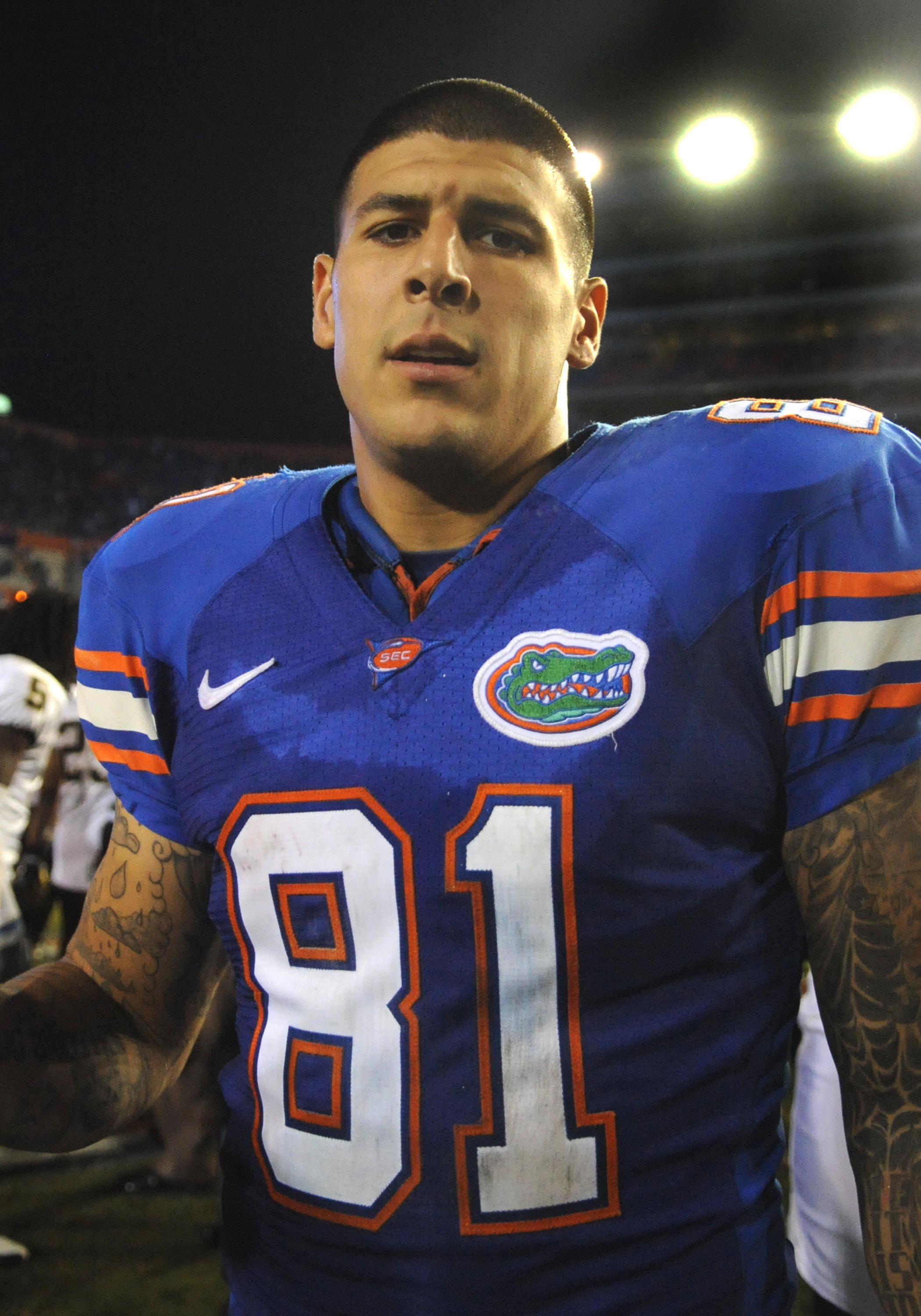Crime is Slate’s crime blog. Like us on Facebook, and follow us on Twitter @slatecrime.
ESPN’s Outside the Lines is reporting that authorities are investigating whether former Florida Gator and New England Patriot Aaron Hernandez was involved in yet another shooting—by my count, the fourth he’s been connected to as of this hour. In 2007 in Gainesville, Fla., two men were shot and wounded while sitting in their car after an alleged altercation at a nightclub. A third man, Randall Cason, originally identified the shooters as Hernandez, then a freshman football player at Florida, and Reggie Nelson, a former Gator who then played for the Jacksonville Jaguars. Cason later went back on those identifications, and the two were never charged in the case—but, in light of recent events, the cops now want to know a bit more about whether the retraction was a “yeah, I identified the wrong guys” sort of thing or a “let’s keep football players on the field” sort of thing.
If true, the story says a lot about Hernandez, whose unsavory past might have more bearing on his unsavory present than I originally thought. But—again, if true—the fact that charges were never brought and that the identification was retracted also says a lot about how criminal activity gets dealt with in towns where college football is king.
You’d be excused for thinking that college football has a drinking problem—or, more specifically, a drinking and punching problem. A couple of weeks ago, Florida linebacker Antonio Morrison was charged with battery after he “took issue with the bouncer because of the cover charge” at a Gainesville bar. LSU’s starting quarterback Jordan Jefferson was arrested in 2011 for allegedly kicking a man in the head in a bar fight. Last December three Oregon State players were arrested for assault after an altercation at the ironically named Impulse Bar and Grill. Last October, Texas Tech’s starting center was arrested after a fight at a campus-area bar. Last June, Texas A&M freshman John “Johnny Football” Manziel, then 19, was arrested in the local “bar district” and charged with “fighting, failure to identify himself and carrying two fake licenses,” because you don’t want to be left in the lurch if one of your fakes gets confiscated, am I right?
What happened to these players in the aftermath of their arrests? In all cases, the harshest consequences were avoided. Johnny Manziel was originally suspended by the university for the entire season, a penalty that was later overturned after coach Kevin Sumlin intervened and said that the football program’s “strict internal punishment” of Manziel should be enough. Jordan Jefferson’s suspension was lifted after a grand jury reduced his charges from a felony to a misdemeanor. The criminal charges against the Oregon State players were also quickly reduced to misdemeanors, though all three were suspended for the Beavers’ bowl game. The Texas Tech center, Deveric Gallington, didn’t miss a game after his arrest. Gallington was only charged with misdemeanors. “Don’t worry,” wrote one commenter on redraiders.com. “The powers to be will get this fixed with the DA just like they do with others cases involving football players at TTU.”
And what about Antonio Morrison? Florida Gators sites and message boards have been full of references to Huntley Johnson, a Gainesville attorney who has had great success in getting Gators off the hook; as a 2010 Associated Press profile put it, “[v]irtually every Gator player who hires him stays out of jail.” “Misdemeanor battery? Huntley Johnson will get that dropped by the 4th,” said a commenter on alligatorarmy.com in reference to the Morrison case, and, sure enough, the charges against Morrison were deferred for six months and will likely be dropped.
That brings us back to Aaron Hernandez. Johnson served as Hernandez’s attorney after a different bar fight in 2007, when the then-17-year-old scuffled with a bouncer at a Gainesville tavern. Hernandez’s juvenile records are sealed, so it’s not been revealed exactly how the case was resolved. It’s abundantly clear, though, that nothing serious came of the matter, as always seems to happen when Johnson represents a Gator football player. Maybe something should have come of it. I still believe that the people who claim that Hernandez’s collegiate troubles presaged these current murder charges are wrong, mostly. NFL rosters are stocked with players who were crazy in college but settled down once they got older and wealthier. But I’m also starting to believe that it’s unhealthy for athletes—or anyone, really—to get accustomed to not getting in trouble for their alleged misdeeds. Maybe facing consequences early in life can help you avoid far graver ones later on down the road.
